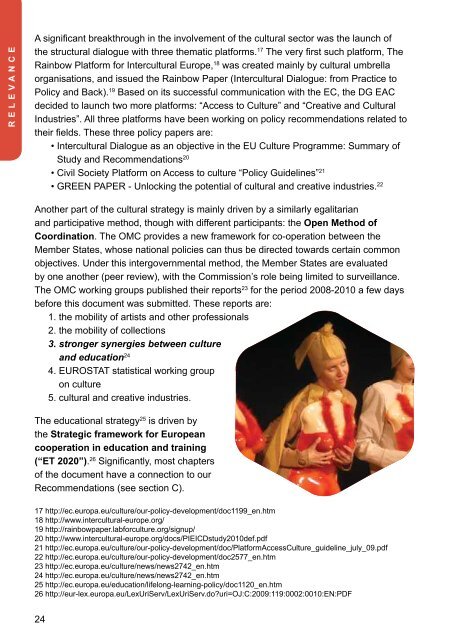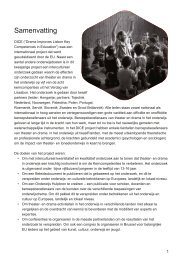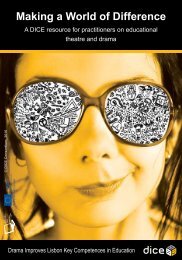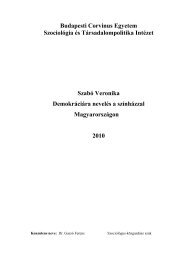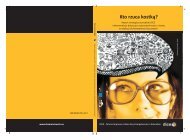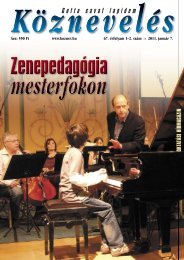Policy Paper - Drama Improves Lisbon Key Competences in Education
Policy Paper - Drama Improves Lisbon Key Competences in Education
Policy Paper - Drama Improves Lisbon Key Competences in Education
You also want an ePaper? Increase the reach of your titles
YUMPU automatically turns print PDFs into web optimized ePapers that Google loves.
Relevance<br />
A significant breakthrough <strong>in</strong> the <strong>in</strong>volvement of the cultural sector was the launch of<br />
the structural dialogue with three thematic platforms. 17 The very first such platform, The<br />
Ra<strong>in</strong>bow Platform for Intercultural Europe, 18 was created ma<strong>in</strong>ly by cultural umbrella<br />
organisations, and issued the Ra<strong>in</strong>bow <strong>Paper</strong> (Intercultural Dialogue: from Practice to<br />
<strong>Policy</strong> and Back). 19 Based on its successful communication with the EC, the DG EAC<br />
decided to launch two more platforms: “Access to Culture” and “Creative and Cultural<br />
Industries”. All three platforms have been work<strong>in</strong>g on policy recommendations related to<br />
their fields. These three policy papers are:<br />
• Intercultural Dialogue as an objective <strong>in</strong> the EU Culture Programme: Summary of<br />
Study and Recommendations 20<br />
• Civil Society Platform on Access to culture “<strong>Policy</strong> Guidel<strong>in</strong>es” 21<br />
• GREEN PAPER - Unlock<strong>in</strong>g the potential of cultural and creative <strong>in</strong>dustries. 22<br />
The current key document of the strategy for youth is the Council Resolution on a<br />
renewed framework for European co-operation <strong>in</strong> the youth field (2010-2018). 27<br />
Several other areas, upon which educational theatre and drama has an impact are <strong>in</strong><br />
the focus of the Commission or its affiliates. One such area is creativity. In our view, the<br />
most important recent publications <strong>in</strong> the field were:<br />
• Arts <strong>in</strong> education and creativity: A literature review 28 (this publication is directly l<strong>in</strong>ked<br />
to our field)<br />
• The Impact of Culture on Creativity - a study for the DG EAC by KEA 29<br />
• Manifesto by the European Ambassadors for Creativity and Innovation 30<br />
• Measur<strong>in</strong>g Creativity: the book and conference materials 31<br />
• Creativity <strong>in</strong> Schools <strong>in</strong> Europe: A Survey of Teachers. 32<br />
Relevance<br />
Another part of the cultural strategy is ma<strong>in</strong>ly driven by a similarly egalitarian<br />
and participative method, though with different participants: the Open Method of<br />
Coord<strong>in</strong>ation. The OMC provides a new framework for co-operation between the<br />
Member States, whose national policies can thus be directed towards certa<strong>in</strong> common<br />
objectives. Under this <strong>in</strong>tergovernmental method, the Member States are evaluated<br />
by one another (peer review), with the Commission’s role be<strong>in</strong>g limited to surveillance.<br />
The OMC work<strong>in</strong>g groups published their reports 23 for the period 2008-2010 a few days<br />
before this document was submitted. These reports are:<br />
1. the mobility of artists and other professionals<br />
2. the mobility of collections<br />
3. stronger synergies between culture<br />
and education 24<br />
4. EUROSTAT statistical work<strong>in</strong>g group<br />
on culture<br />
5. cultural and creative <strong>in</strong>dustries.<br />
The educational strategy 25 is driven by<br />
the Strategic framework for European<br />
cooperation <strong>in</strong> education and tra<strong>in</strong><strong>in</strong>g<br />
(“ET 2020”). 26 Significantly, most chapters<br />
of the document have a connection to our<br />
Recommendations (see section C).<br />
17 http://ec.europa.eu/culture/our-policy-development/doc1199_en.htm<br />
18 http://www.<strong>in</strong>tercultural-europe.org/<br />
19 http://ra<strong>in</strong>bowpaper.labforculture.org/signup/<br />
20 http://www.<strong>in</strong>tercultural-europe.org/docs/PIEICDstudy2010def.pdf<br />
21 http://ec.europa.eu/culture/our-policy-development/doc/PlatformAccessCulture_guidel<strong>in</strong>e_july_09.pdf<br />
22 http://ec.europa.eu/culture/our-policy-development/doc2577_en.htm<br />
23 http://ec.europa.eu/culture/news/news2742_en.htm<br />
24 http://ec.europa.eu/culture/news/news2742_en.htm<br />
25 http://ec.europa.eu/education/lifelong-learn<strong>in</strong>g-policy/doc1120_en.htm<br />
26 http://eur-lex.europa.eu/LexUriServ/LexUriServ.do?uri=OJ:C:2009:119:0002:0010:EN:PDF<br />
24<br />
We were pleased to read Eurydice’s report on Arts and Cultural <strong>Education</strong> at<br />
Schools <strong>in</strong> Europe, 33 which could be a good counterpart to our report: it covers the<br />
<strong>in</strong>stitutional background of the area.<br />
Students who participate regularly <strong>in</strong> drama activities are more will<strong>in</strong>g to vote and to<br />
participate actively <strong>in</strong> public issues (see section B.3.). In this way, educational theatre and<br />
drama could be a helpful tool to channel students towards the open consultations of the<br />
European Commission, such as the “Social Dialogue” 34 or “Your Voice <strong>in</strong> Europe”. 35<br />
Besides the European Institutions we must mention the Culture section of UNESCO 36<br />
which takes a lion’s share <strong>in</strong> sett<strong>in</strong>g a global arts education agenda. The key documents<br />
are:<br />
• Road Map for Arts <strong>Education</strong> 37<br />
• Seoul Agenda: Goals for the Development of Arts <strong>Education</strong> 38<br />
• Invest<strong>in</strong>g <strong>in</strong> Cultural Diversity and Intercultural Dialogue - UNESCO World Report 39<br />
• Convention on the Protection and Promotion of the Diversity of Cultural<br />
Expressions 40<br />
• Second World Conference on Arts <strong>Education</strong>. 41<br />
27 http://ec.europa.eu/youth/pdf/doc1648_en.pdf<br />
28 http://www.creativitycultureeducation.org/data/files/5-b-arts-<strong>in</strong>-education-and-creativity-2nd-edition-91.pdf<br />
29 http://www.keanet.eu/docs/execsum_creativity_english%20.pdf<br />
30 http://ec.europa.eu/education/lifelong-learn<strong>in</strong>g-policy/doc/year09/manifesto_en.pdf<br />
31 http://ec.europa.eu/education/lifelong-learn<strong>in</strong>g-policy/doc2082_en.htm<br />
32 http://ftp.jrc.es/EURdoc/JRC55645_Creativity%20Survey%20Brochure.pdf<br />
33 http://eacea.ec.europa.eu/education/eurydice/documents/thematic_reports/113EN.pdf<br />
34 http://ec.europa.eu/social/ma<strong>in</strong>.jsp?catId=329&langId=en<br />
35 http://ec.europa.eu/yourvoice/<strong>in</strong>dex_en.htm<br />
36 http://portal.unesco.org/culture/en/ev.php-URL_ID=2916&URL_DO=DO_TOPIC&URL_SECTION=201.html<br />
37 http://portal.unesco.org/culture/en/ev.php-URL_ID=30335&URL_DO=DO_TOPIC&URL_SECTION=201.html<br />
38 http://portal.unesco.org/culture/en/files/41117/12790338165Seoul_Agenda_Goals_for_the_Development_of_Arts_<br />
<strong>Education</strong>.pdf/Seoul%2BAgenda_Goals%2Bfor%2Bthe%2BDevelopment%2Bof%2BArts%2B<strong>Education</strong>.pdf<br />
39 http://unesdoc.unesco.org/images/0018/001847/184755e.pdf<br />
40 http://portal.unesco.org/culture/en/ev.php-URL_ID=11281&URL_DO=DO_TOPIC&URL_SECTION=201.html<br />
41 http://portal.unesco.org/culture/en/ev.php-URL_ID=39674&URL_DO=DO_TOPIC&URL_SECTION=201.html<br />
25


